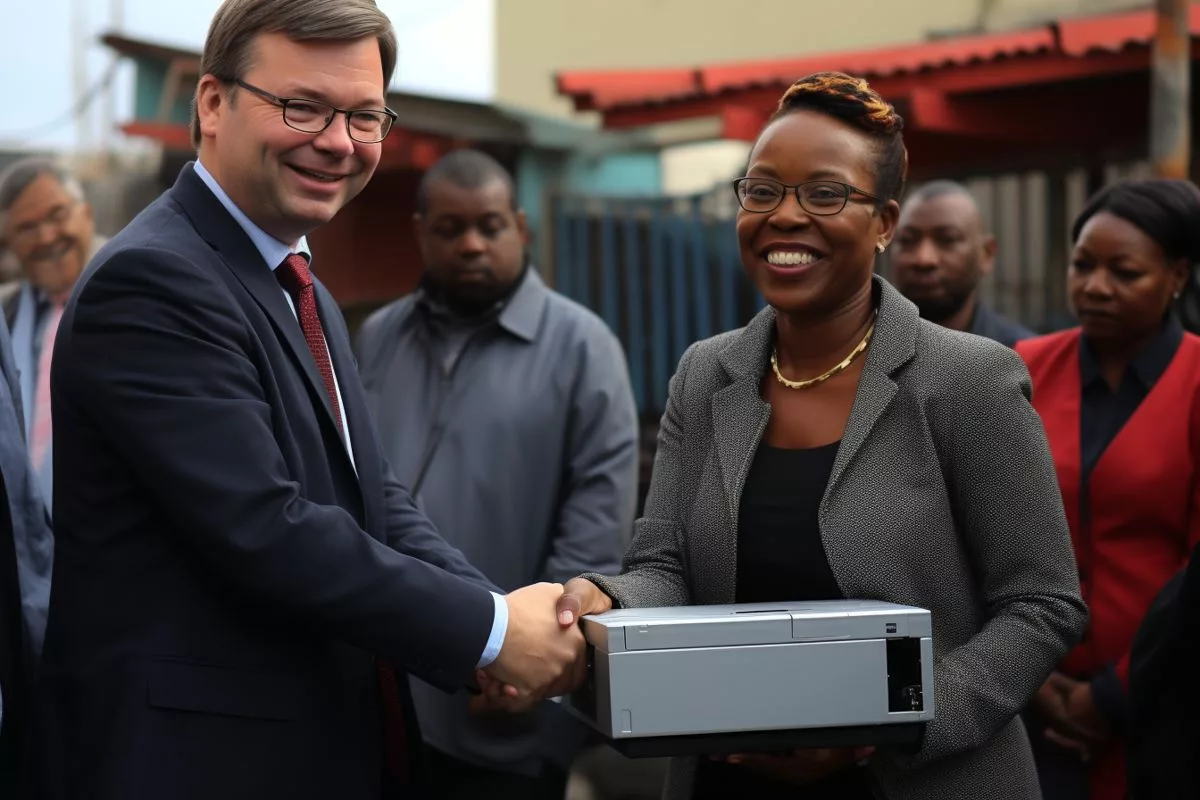Deputy Minister in the Presidency, Pinky Kekana, visited the Mangaung Metropolitan Municipality to evaluate economic and service delivery initiatives. The visit included meetings with influential individuals, such as MEC Ketso Makume and Executive Mayor Cllr Gregory Nthathisi, to discuss progress on addressing past challenges and creating an enabling environment for growth and development. The DPME has already offered support through frontline monitoring reports and interventions, and Deputy Minister Kekana emphasized the importance of a united approach to overcome remaining hurdles and restore the municipality’s former standing.
What was Deputy Minister Kekana’s oversight visit to Mangaung Metropolitan Municipality about?
Deputy Minister in the Presidency responsible for Planning, Monitoring, and Evaluation (DPME) Ms. Pinky Kekana undertook an oversight monitoring visit to evaluate economic and service delivery-related initiatives in the Mangaung Metropolitan Municipality. Engaging with stakeholders was a critical component of the visit, and Deputy Minister Kekana met with influential individuals such as Free State Human Settlements, Cooperative Governance and Traditional Affairs MEC Ketso Makume, Mangaung Executive Mayor Cllr Gregory Nthathisi, and Mangaung Deputy Mayor Cllr Lulama Titi-Odlili, among others.
Deputy Minister Kekana’s Oversight Visit and Stakeholder Engagement
To reignite the Mangaung Metropolitan Municipality’s potential, Deputy Minister in the Presidency responsible for Planning, Monitoring, and Evaluation (DPME) Ms. Pinky Kekana, undertook an oversight monitoring visit on October 31, 2023. The purpose of this visit was to evaluate economic and service delivery-related initiatives within the Free State Province’s municipality. Engaging with stakeholders was a critical component of this visit, as Deputy Minister Kekana met with influential individuals such as Free State Human Settlements, Cooperative Governance and Traditional Affairs MEC Ketso Makume, Mangaung Executive Mayor Cllr Gregory Nthathisi, and Mangaung Deputy Mayor Cllr Lulama Titi-Odlili, among others.
The Mangaung Metropolitan Municipality was unfortunately subjected to intervention by the national government, leading the DPME’s Local Government Unit to supervise and assess service delivery projects in the region. Deputy Minister Kekana acknowledged the positive united efforts to stabilize and rejuvenate the municipality while highlighting the progress in appointing a Municipal Manager and recognizing the remaining challenges. She pledged the DPME’s commitment to continue supporting the municipality in overcoming these hurdles for the citizens’ benefit and South African economy.
Deputy Minister Kekana underscored the importance of a united approach, saying, “If we can all work together through an integrated approach and create an enabling environment, it will help the municipality and lead to enhanced service delivery, investments, and economic growth.” Her immediate objective is to aid the Mangaung Metropolitan Municipality in extricating itself from the S139 constitutional intervention.
DPME Support and Frontline Monitoring
The DPME has already offered assistance to the municipality through extensive frontline monitoring reports and suggested interventions. These are intended to bolster the municipality’s capabilities and overall functioning. To further enhance coordination and collaboration among those responsible for intervening in struggling municipalities, the DPME will adopt the role of “monitor of the monitors” in intervention programs. This strategy, to be piloted in Mangaung, aims to ensure that support provided by principal interveners in all municipalities, particularly dysfunctional ones and those under administration per Section 139, is better coordinated.
During her visit, Deputy Minister Kekana also spearheaded frontline monitoring of Integrated Public Transport Network projects. Together with other crucial stakeholders, she committed to regular meetings and ongoing collaboration to eliminate bottlenecks and restore the Metro. This dedication to working together is essential for the Mangaung Metropolitan Municipality to regain its former standing and guarantee that residents receive the necessary services.
The Revival Process and Future Outlook
The resurgence of the Mangaung Metropolitan Municipality is a complicated and multifaceted endeavor that requires collaboration and backing from diverse stakeholders. Government officials, municipal representatives, and citizens must all cooperate to address the challenges that obstruct service delivery, investment, and economic growth. By promoting an integrated approach and establishing an enabling environment, the municipality can surmount these obstacles and witness a revitalization in both its economy and overall operations.
In this context, the oversight monitoring visit led by Deputy Minister Pinky Kekana and her engagement with key stakeholders represents a crucial step towards restoring the Mangaung Metropolitan Municipality to its former prominence. The collective efforts of all parties involved will be vital in enhancing service delivery, attracting investments, fostering economic growth, and ultimately improving the lives of residents within the municipality.
To conclude, the revitalization of the Mangaung Metropolitan Municipality demonstrates the power of collaboration and a common vision among various stakeholders. As they work together to address the challenges, the municipality has a bright future – one that promises improved service delivery, increased investments, and economic growth for the benefit of its residents and the wider South African economy.
1. What is the purpose of Deputy Minister Kekana’s visit to the Mangaung Metropolitan Municipality?
Deputy Minister Kekana’s visit was to evaluate economic and service delivery initiatives and engage with stakeholders to create an enabling environment for growth and development.
2. Who did Deputy Minister Kekana meet with during her visit?
Deputy Minister Kekana met with influential individuals such as MEC Ketso Makume and Executive Mayor Cllr Gregory Nthathisi, among others.
3. What support has the DPME offered to the Mangaung Metropolitan Municipality?
The DPME has offered assistance through frontline monitoring reports and interventions to bolster the municipality’s capabilities and overall functioning.
4. What is the DPME’s new role in intervention programs?
The DPME will adopt the role of “monitor of the monitors” in intervention programs to enhance coordination and collaboration among those responsible for intervening in struggling municipalities.
5. What challenges does the Mangaung Metropolitan Municipality face?
The municipality faces challenges that obstruct service delivery, investment, and economic growth.
6. What is the importance of a united approach for the municipality?
A united approach is essential for the municipality to overcome remaining hurdles and restore its former standing.
7. What is the objective of the DPME’s support to the municipality?
The objective of the DPME’s support is to aid the Mangaung Metropolitan Municipality in extricating itself from the S139 constitutional intervention.
8. What is the future outlook for the Mangaung Metropolitan Municipality?
Collaboration and backing from diverse stakeholders are vital for the municipality to address its challenges and witness a revitalization in both its economy and overall operations.








